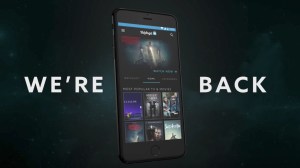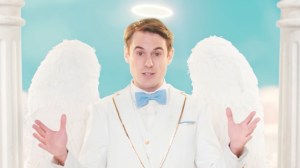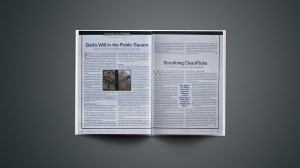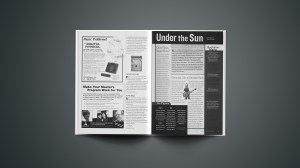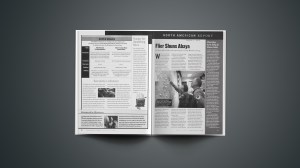In this series
Little Secrets is full of human failings and misbehavior—deceit, dishonesty, pride, fear— but strangely void of that short list of behaviors some Christians single out as inappropriate. In spite of its sanitized context, the film has enough humor and spirit to keep young viewers, and perhaps some grownups, entertained. (My full review is at Looking Closer.)
Director Blair Treu has cast some familiar television faces: Once and Again's Evan Rachel Wood has the lead role of a young violinist, Emily, and Seventh Heaven's David Gallagher plays David, the only eligible boyfriend in sight. The cheery script by Jessica Barondes focuses on Emily's dream of being a violinist in a youth symphony. As she practices for a big audition, her artistic ambition is disrupted by her unique hobby: a help stand reminiscent of the psychiatric booth hosted by Lucy in the Peanuts comic. For 50 cents a session, Emily plays Dr. Laura to her neighborhood's many adorable children, and promises not to reveal their misdeeds. All the while, though, she is hiding a deep, personal secret of her own that would shock her community. Will Emily be able to keep the secrets and earn a spot in the symphony?
Many religious press critics are beside themselves with enthusiasm for this sprightly film. Holly McClure (Crosswalk) says, "This is a well-written, wonderful story and certainly one of the more entertaining children's movies of the summer. The real secret to this gem of a movie is its meaningful message, which will make it a family favorite."
Ted Baehr (Movieguide) calls it "a beautifully crafted story. This is the type of movie that Sunday school classes could spend a long time discussing … the type of movie which families will enjoy." But he adds, "As successful as it is in presenting biblical principles within the framework of the story, it fails to grab the audience at the beginning and it takes a certain amount of willpower to wait until the story hooks the audience."
Ken James (Christian Spotlight) calls it "a cute movie with nothing objectionable. The overall theme is that having secrets that your loved ones don't know about can be dangerous and detrimental. How often does that get taught to our youth?"
Bob Smithouser (Focus on the Family) writes, "The film … makes solid statements about loyalty, family relationships, forgiveness, and the consequences of driving drunk. Except for a mild crudity or two, there are no unpleasant surprises. Little Secrets is a little movie with a big heart."
Mainstream critics are not offended and seem confident that children will enjoy the project. But they question whether its lack of realism is a detriment. Roger Ebert says, "The biggest surprise in Little Secrets is that Ozzie and Harriet don't live next door. The movie takes place in an improbably perfect suburban neighborhood where all the kids wear cute sportswear and have the kinds of harmless problems that seem to exist only so that they can be harmless problems. Then of course there are some Big Problems which are rendered harmless, too. This is a very reassuring film. I am rating this movie at three stars because it contains absolutely nothing to object to. That in itself may be objectionable, but you will have to decide for yourself."
"Treu scores his finest points off the little kids' unfailing cuteness," writes Leslie Carnhi (Village Voice), "but the film's broad performances and heavy-handed moralizing strike a note of condescension sure to be heard by the alienated teenager within us all."
***Writer/director Andrew Niccol's last movie, The Truman Show, depicted a man who unknowingly becomes a celebrity as he grows up in a fake environment. Now Niccol turns things around—Simone is about a fake actress, a digital hoax, who becomes a superstar and a media idol in the real world.
Michael Elliott (Movie Parables) considers the film's implications: "Simone skewers the idol-worshipping insanity which fuels the Hollywood scene. Some of the humor may be too pointed or 'inside' to be appreciated by all but there is much that will be universally enjoyed. There is also a lesson buried beneath the exaggerated humor. An idol does not have to be a 'golden calf' or a religious icon. It is anything that takes up residence in our hearts as the ultimate object of our desire. There's no question that the fanatical devotion often displayed by followers of today's pop star celebrities exceeds reason, reaching a near-religious experience."
Lisa Rice (Movieguide) is impressed: "Simone provides many good laughs, and its gentle poking at the Hollywood system is quite entertaining. The acting is superb, and the writing is tight." But she also tells viewers to beware of "anti-capitalist, politically correct elements." Similarly, Mary Draughon (Preview) raves, "Simone stands out as one of the few recent films aimed at older audiences that can be recommended."
But for Phil Boatwright, the film's non-offensive nature is not necessarily enough. "The film is long and while clean, it's boring … a superficial attempt at making a statement about the superficiality of society … predictable and unmoving."
Steven D. Greydanus (Decent Films) faults the film for depending on an actress to play a digital invention: "A timeless bit of storytelling advice is: 'Show, don't tell.' Actually showing us a truly bleeding-edge synthespian would have made Nichol's point far more effectively than anything his characters might be trying to tell us."
Mainstream critics say Simone doesn't go far enough in its lampoon. Peter Travers (Rolling Stone) says, "Niccol … gets this Hollywood satire off to a rousing start. But the middle flattens, despite Pacino firing on all cylinders. And the end just nose-dives into something silly and, worse, sentimental." Roger Ebert (Chicago Sun-Times) writes, "It's fitfully funny but never really takes off. Out of the corners of our eyes we glimpse the missed opportunities for some real satirical digging. The problem, I think, is that in aiming for too wide an audience, Niccol has made too shallow a picture."
***Fantasy and reality clash again in this week's darkest, most troubling entry. In Mark Romanek's highly acclaimed twisted comedy One Hour Photo, Robin Williams earns raves playing Sy, a photo lab employee who becomes obsessed with one of the families whose pictures he regularly prints. As Sy "connects the dots" of their photos with his imagination and presumption, he constructs dangerously false impressions. His suspicions lead him into obsession, and soon he is stalking family members, headed toward shocking intervention.
Anne Navarro (Catholic News) writes, "The film is effectively constructed, keeping the viewer absorbed despite beginning with the ending and telling the story in flashback. As the story builds to its climax, though, it becomes like watching a car wreck—the viewer is unable to keep his eyes off it despite the unpleasantness. However, viewers should be warned that there is a particularly upsetting sexual scene which is stomach-turning, although it does serve to illustrate the depths of Sy's psychological problems which lead to his cruel behavior."
Holly McClure (Crosswalk) says, "I didn't like this movie's slow pace until I realized it allows you to get you into Sy's mundane rhythm of life. This dark and depressing story is sometimes hard to watch, but Williams delivers a brilliant performance that is both mesmerizing and convicting. His character sort of grew on me. Ironically, Sy ends up being judged for a wicked deed that ultimately exposes the wickedness of others."
Phil Boatwright says, "During the film's examining of the sometimes deceiving images people can present of themselves, it leaves the viewer unnerved, with a sense of creepiness. Unlike the recent film Signs, which entertains with its unsettling spookiness while at the same time, reflecting spiritual messages, One Hour Photo is the reverse—a dark, depressing film. The film merely fuels mistrust of anyone."
Mainstream critics focused on praising Williams' performance, but some had reservations about Romanek's preoccupation with stylish effects.
***Serving Sara, the new comedy with Liz Hurley and Matthew Perry, received such condemnation, from religious and mainstream press alike, it is hardly worth mentioning.
Phil Boatwright speaks for almost everyone: "Crude humor and easy and objectionable language are used in place of wit, and the plot lags into moments of tedium. There's also very little energy, momentum or style to the production or the performances."
Holly McClure (Crosswalk) says, "I wanted to like this movie because of Perry, but I was greatly disappointed by the story." Michael Elliott (Movie Parables) argues, "The blame for this lies with the director and screenwriters. They've tried to make a formula comedy but have chosen to use ingredients that have only produced weak comedies in the past."
With a mind for the message, Lisa Rice (Movieguide) concludes that the movie "will leave Christian viewers sad, because Joe and Sara's relationship is based on wounds, greed, revenge, and lust, poor foundations for a lasting tie." She also suggests that the movie's jokes about Texas are actually a backhanded critique of President Bush by liberal moviemakers.
For more negative religious press reviews of the film, visit Catholic News and Preview.
Table Talk
Will you be buying MovieMask so you and your family can enjoy the same movies as the rest of America, minus the profanity, nudity, and violence? Or will you be buying CleanFlicks' pre-sanitized edits of videos?
The flood of responses I received after raising the question in the last Film Forum made it clear that many readers are eager to use these options. They have children — and their rights — in mind. Others, however, defend the artists who are shocked and appalled that their work will be subjected to such manipulation. For them, violence, nudity, and profanity may occasionally have a place. Further, they argue that shielding our children and ourselves by editing may be a form of "protection" that does more harm than good.
Thank you to all who replied. We can only excerpt a few of the many thoughtful and impassioned replies that came in.
Some respondents recommended the alternative of reading to children instead of offering them altered art. Frank asks: "Why is it that parents would rather rely on someone or something else to do their parenting for them? If a scene in a movie requires 32 edits (i.e. the beach scene from Saving Private Ryan) then maybe it isn't a movie that children should be viewing. Let children be children with age-appropriate movie viewing, or better yet, read to them."
Josh Hurst speaks from experience: "When I was a kid, my parents would always watch movies with me, and then discuss them with me afterward. At the time, it annoyed me, but, in retrospect, I'm thankful that they did what they did. It helped me to develop a habit of thinking about movies, and it exposed me to what the world is really like without totally overwhelming me."
Arnie Adkison writes, "As the father of two young boys, I wish to retain every right I can to determine what types of art they ingest. However, I believe that freedom remains with the remote—with the power of choice, to watch or not watch. One of the great things about the DVD is the ability we have as parents to 'skip ahead' … but I think our editing freedom stops there."
Chad Brian asks (rhetorically), "Should we censor parts of the Bible to make it palatable for children?"
On the other hand, the Bible inspires the arguments of many who support distribution of the editing software. Michael Roberts writes, "Does it not say in James 1:27 that we, as followers of Christ, are 'to keep oneself from being polluted by the world?' I am sick and tired of the filth being spewed out of Hollywood. This is a great idea and I suspect comes fully under the power of the Holy Spirit."
Tom Delmonte appeals to another source—American history. "Didn't a founding father respected by most Americans—Jefferson—do the same when he clipped out section of the Bible he did not like?" [Editor's note: Yes, he did. Does that make it an admirable thing to do?] Delmonte adds: "The same editing has been done long before when parents read books to their children and glossed over less appropriate parts."
Others point out that this process that is nothing new. Jonathan Mark Purple observes, "This has been done on in-flight movies for years, which get special editing, with no complaints from the film-makers. So why all the fuss now?"
Filmmakers' protests only strengthen the resolve of some who view Hollywood as a giant anti-family machine. Richard L. Kuhn Jr. argues, "I personally love the open contempt [the protesting filmmakers] show for the audiences—it shows their true selves and makes it easier to show why there is a problem today in TV and movies."
For some, it comes down to the definition of censorship. Russ Breimeier echoes: "To suggest that we the viewers have no right to edit out what we don't want is ridiculous! It's not censorship if the original film is preserved for anyone in the public to view. No one is banning the movie or preventing the director's original vision from reaching the public. Are we not allowed to fast forward past an objectionable scene? Is it okay to get up for popcorn?"
Robin Taylor agrees: "It's not as if one is being forced to view the 'cleaner' version. It merely gives people a choice. They need to be careful that they are not infringing on my right to freedom from uncomfortable or objectionable scenes in my entertainment."
Donald E. King takes the other side: "If I buy a nude statute I am allowed to drape it with cloth (arguably). But for a third party to make such changes electronically and make it available to the public seems draconian and represents an erosion of artistic freedom. No one is forcing anyone to view anything they feel objectionable."
Cliff Vaughn of EthicsDaily.com joins the debate. "To borrow the phrase often applied to technological advances in science, 'Just because we can doesn't mean we should.' Not all film qualifies as artistic achievement, but some of it does. And some of it was never meant to be consumed, understood, or grappled with by a 5-year-old. 'Cutting it clean' may suffice for one rigid definition of cleanliness in art. At the same time, it mangles, disrespects and falsifies someone else's work."
Amy from Pasadena agrees that while MovieMask "is not a copyright infringement … it is an artistic abomination. Saving Private Ryan without the gory opening scene? Not only does it detract from the film, it softens history to make it 'palatable.' The history books that teach our children have already done enough of that. MovieMask is an attempt to force our evangelical Christian values on the world at large. While I would like to live in a world where everyone shares my values and worldview, I do not live in that world."
Rita Reigel adds,"Those who lived, suffered, and died during the Holocaust and D-Day Invasion … do not deserve to have their suffering dishonored by pretending these events were 'bloodless.' If they had to withstand these events, then we should at least have the moral courage to watch movies that portray these events without flinching."
But Sterling Koch, pastor to youth and families at St. Patrick's Episcopal Church in Thousand Oaks, California, writes: "What a great idea! The gore and nudity made [Schindler's List and Saving Private Ryan] films that I recommended with a great deal of excuses and embarrassment. People may argue that Private Ryan without the gore isn't real life. But do we all have see the 'real life' of war to appreciate it? I doubt many veterans who saw it firsthand would say so."
This debate is nothing new. Beth Rambo, writing from the English Department at Campbell University, reminds us of a famous argument made by the great Christian poet John Milton in his essay against censorship, "Areopagitica":
He that can apprehend and consider vice with all her baits and seeming pleasures, and yet abstain, and yet distinguish, and yet prefer that which is truly better, he is the true warfaring Christian. I cannot praise a fugitive and cloistered virtue, unexercised and unbreathed, that never sallies out and sees her adversary, but slinks out of the race where that immortal garland is to be run for, not without dust and heat. Assuredly we bring not innocence into the world, we bring impurity much rather: that which purifies us is trial, and trial is by what is contrary.
Rambo concludes, "Parents do have the right, and duty, to protect their children from certain elements of a work of art. But physically altering the art is not the way to do it."
I am also concerned that our honorable desire to protect ourselves from the world's evils too easily and too often leads to spiritual weakness rather than immunity. To protect children from secular entertainment's harms by reading and watching alongside, teaching them to sift stories for truth and falsehood, trains to grow from digesting simple work to more complex work—to borrow a Scriptural phrase, "from milk to meat." This, I believe, is more fruitful than blinding them to the true complexities of the world. Learning to grapple with the world's sinfulness—and their own—prepares them to resist temptation rather than merely hide from it. Jesus did not wear blinders to save him from being tempted; neither did the Apostles. Remember, the full armor of God is for folks on the battlefield. Of course, parents should be vigilant in protecting children; they should also teach train them up to "renew their minds" and become aggressive thinkers so they can stare temptation in the face and, with God's grace, remain unpolluted.
Next week: Readers turn in ideas for Mel Gibson's new project—a movie on the life of Christ. Plus, a look at Robert DeNiro in City by the Sea, and the increasingly popular surprise hit of the summer—My Big Fat Greek Wedding.
Copyright © 2002 Christianity Today. Click for reprint information.


